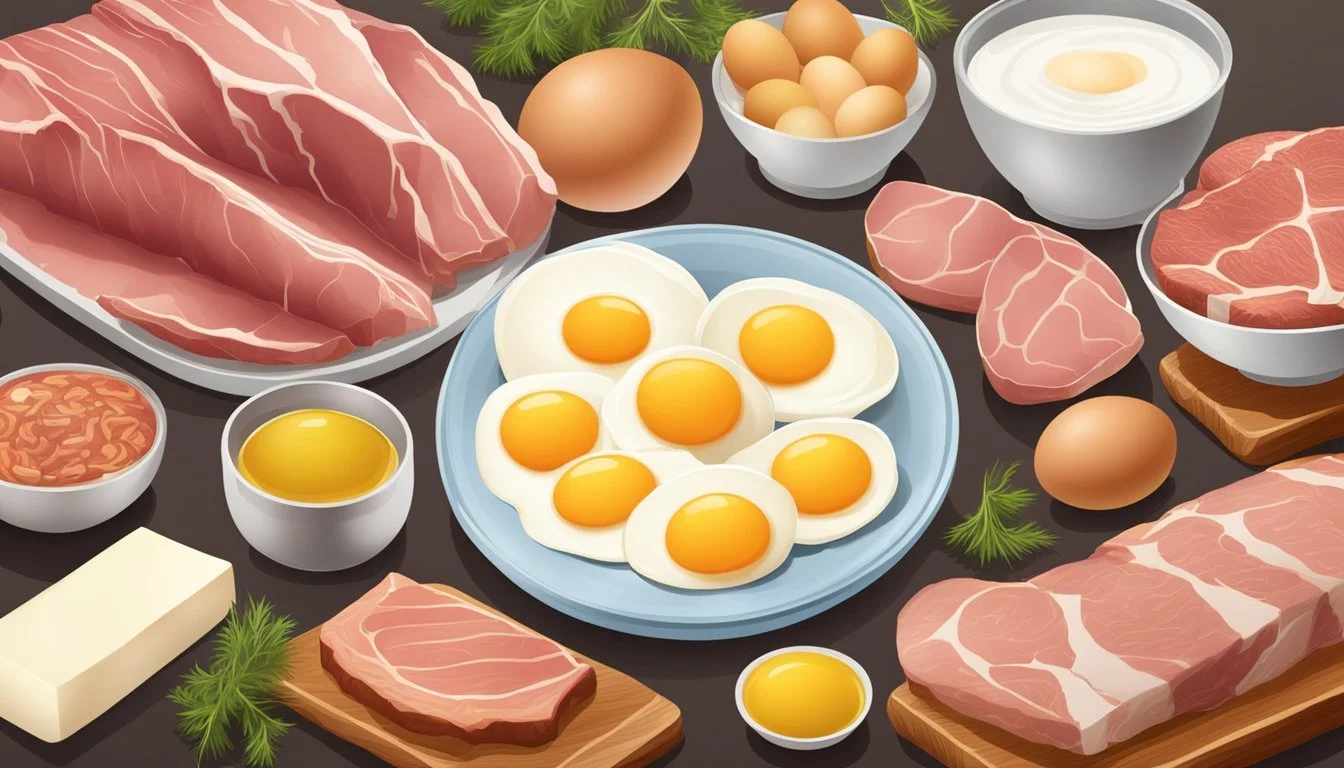Carnivore Diet and Sex Drive
Unveiling the Connection
This Article is Part Of Our Guide on the Carnivore Diet
The relationship between diet and sex drive has been a topic of discussion among health enthusiasts and researchers for years. A carnivore diet, which consists primarily of animal products and excludes plant-based foods, has gained attention for its potential impact on libido. Advocates of the diet report an increase in sex drive, suggesting that the high protein and fat content, which are essential for hormone production, could be beneficial in this regard. Hormones such as testosterone play a significant role in sexual function and desire, and dietary fat is crucial for its synthesis.
However, the carnivore diet and its effects on sex drive remain controversial and understudied. While personal testimonials suggest a positive correlation, there is a need for scientific research to back these claims. Nutrition plays a critical role in overall health, and by extension, sexual health. The diet's emphasis on consuming meat might influence energy levels, mood, and physiological functions, all of which are interlinked with sexual desire and performance. Nonetheless, it is essential to approach such anecdotes with caution, as individual experiences with the carnivore diet can vary, and other factors like physical activity and overall lifestyle also significantly influence libido.
Fundamentals of the Carnivore Diet
The Carnivore Diet centers on consuming animal products and excludes plant-based foods, focusing heavily on high-fat and protein-rich foods.
Definition and Overview
The Carnivore Diet is a restrictive regimen that consists solely of animal products. It emphasizes protein and fat intake from meat while eliminating carbohydrates, vegetables, fruits, and grains. Proponents argue that it can lead to various health benefits by simplifying dietary choices and focusing on nutrient-dense foods.
Primary Foods Consumed
The following list is for the primary foods consumed in the Carnivore Diet:
Meat
Examples: Beef, lamb, pork, poultry
Organ Meats
Examples: Liver, kidney, heart
Fish and Seafood
Examples: Fatty fish (such as salmon), shellfish
Eggs
Examples: Chicken eggs, duck eggs
Dairy Products
Examples: Cheese, butter (some variants of the diet allow for dairy)
These foods provide essential nutrients such as zinc, iron, vitamins A and D, and various B vitamins.
Exclusion of Plant-Based Foods
The diet strictly eliminates all plant-based foods. This means no vegetables, fruits, grains, or legumes. The rationale is to reduce anti-nutrients and carbohydrates, increasing the intake of nutrients from animal products. Critics of the diet often raise concerns about the potential for increased cholesterol levels and the long-term sustainability of such a restrictive diet.
Nutritional Impacts on Sex Drive
Diet plays a crucial role in hormonal health and sexual drive, with particular nutrients and macronutrients directly influencing libido and hormone production.
Role of Macronutrients
Macronutrients are the building blocks of diet that provide energy and support multiple functions within the body, including sexual health. Proteins, fats, and carbohydrates each have roles in hormone production and libido. Diets rich in protein, such as the carnivore diet, may support increased levels of testosterone, the primary male sex hormone, due to their potential to stimulate hormone production. Fats, particularly those from sources like olive oil and fatty fish which are high in omega-3 fatty acids, are also essential, as they are precursors for hormone synthesis and may contribute to improved libido.
Influence of Specific Nutrients on Libido
Specific nutrients can have a direct impact on hormone levels and sexual desire. Zinc, for example, is critical for testosterone production and fertility; oysters and red meat are notable sources of zinc. Vitamins, particularly Vitamin D, found in fatty fish, beef liver, and fortified foods, are also important for maintaining adequate testosterone levels. Omega-3 fatty acids, which promote hormonal balance and blood flow, can be found in seafood such as salmon and may contribute to enhanced libido.
By maintaining a balanced intake of these specific nutrients, individuals may find their sexual desire and capacity for sexual satisfaction affected positively.
Health Benefits and Risks
The carnivore diet is debated for its potential to enhance libido through weight loss and hormonal balance. However, risks include a lack of nutrition diversity and possible long-term health impacts.
Advantages of the Carnivore Diet
Weight Loss: As proponents suggest, the carnivore diet may lead to significant weight loss, which can inversely impact sex drive, particularly in cases of obesity. Reduced body weight is associated with higher testosterone levels and improved sexual function.
Metabolic Syndrome and Type 2 Diabetes: Anecdotal evidence hints at the diet's capability to improve metabolic health. This improvement might include better control of blood sugars in individuals with type 2 diabetes.
Inflammation: A reduction in inflammation is another potential benefit linked to this diet, which may contribute to enhanced blood flow and better overall health.
Mental Health: Some individuals report a boost in mental clarity and reduction in mental health disorders, which could positively impact libido.
Potential Health Concerns
Nutrition: Exclusive consumption of animal products risks deficiencies in fiber, vitamins, and minerals found primarily in plant-based foods.
Medications: People may attempt to use the diet to reduce the need for medications related to obesity or metabolic health; however, they should proceed under medical supervision.
Kidney Disease: A diet high in protein may exacerbate kidney issues, so individuals with kidney disease should consider this risk seriously.
Long-Term Health: As research is still ongoing, the long-term health impacts of a strictly carnivore diet remain uncertain, particularly concerning cardiovascular health.
Sexual Health and Function
The carnivore diet may influence sexual health by affecting hormone levels and erectile function, which are critical components for a healthy sex life.
Carnivore Diet and Hormonal Balance
The carnivore diet may impact the balance of key hormones such as testosterone and estrogen. Testosterone, the primary male sex hormone, is crucial for maintaining libido and sexual function. It is suggested that the high protein and fat intake of a carnivore diet might support the production of testosterone. Conversely, as individuals age, natural hormonal changes can lead to a decline in testosterone levels, possibly affecting libido. The diet's role in estrogen balance also merits consideration, although its effects are less directly associated with a carnivore diet.
Effects on Erectile Function and Fertility
Erectile function and fertility may be influenced by the nutrients found in a carnivore diet. Adequate blood flow is essential for erectile function, and certain foods within this diet, such as red meat, are rich in nutrients that might help support vascular health. Nonetheless, erectile dysfunction can result from various causes, including impaired blood flow and psychological factors. Fertility, on the other hand, depends on both hormonal balance and healthy sperm production. The intake of animal fats and proteins provides essential building blocks for hormone and sperm production, potentially having a positive impact on fertility.
Psychological Aspects and Mood
The carnivore diet's impact on sexual drive may also be mediated through psychological pathways, including mood regulation and mental well-being, both of which are critical to a healthy libido.
Impact on Mental Well-being
Mental well-being is deeply intertwined with libido. A diet high in animal products, like the carnivore diet, has been reported by some to enhance feelings of clarity and cognition, which could indirectly bolster sexual desire. The absence of potentially inflammatory plant-based foods might contribute to a reduction in brain fog and fatigue, promoting a sharper mental state which is essential for maintaining a healthy libido.
Diet and Emotional Health
Emotional health, characterized by lower levels of stress, depression, and anxiety, plays a pivotal role in sexual desire. The carnivore diet could affect emotional health by stabilizing blood sugar levels, which in turn may moderate mood swings and increase energy levels. Nevertheless, it is important to note that the carnivore diet's long-term impact on emotional health, particularly concerning dietary fats, is not yet fully understood and warrants further research.
Physical Performance and Composition
The carnivore diet plays a pivotal role in physical performance and body composition, particularly through its effects on muscle building, weight management, and metabolism.
Carnivore Diet in Muscle Building
The carnivore diet, being high in protein, is considered effective for building and maintaining muscle mass. Protein serves as the building block for muscles and is essential in the repair and growth process post-exercise. The consumption of adequate amounts of meat, a feature of the carnivore diet, directly supplies the body with essential amino acids. This can support an individual's ability to sustain or increase their muscle mass, particularly when combined with regular strength training exercises.
Weight Management and Body Composition
Weight loss and body composition improvements are often reported by individuals following a carnivore diet. High-protein diets like this one can enhance metabolism and reduce appetite, aiding in fat loss while preserving muscle mass. A diet dominated by meat could also lead to a reduction in body fat, contributing to a leaner body composition. However, it's essential to maintain a balanced approach to ensure overall health, as a diet exclusively focusing on meat may miss out on other nutrients provided by a more varied diet.
Lifestyle Considerations
When adopting any diet, the structure of daily meals and physical activity levels are pivotal factors. They both directly influence energy levels and overall well-being, which can have a ripple effect on one's sex drive.
Daily Diet Structure
A carnivore diet is a high-protein, low-carbohydrate approach to eating, where individuals consume exclusively animal products. Daily meal planning revolves around meat, fish, and eggs, often omitting other food groups completely.
Breakfast: might include eggs and bacon, focusing on incorporating various fats like those found in certain fish.
Lunch and Dinner: typically consist of red meats, poultry, or organ meats, providing sustained energy without the energy spikes commonly associated with high-carb intake.
Exercise and Physical Activity
Regular exercise is an integral part of a healthy lifestyle and can positively affect libido by improving circulation and cardiovascular health. Within the context of a carnivore diet, individuals often report an increase in energy which can translate to more vigorous and consistent exercise routines.
Types of Exercise: Resistance training and aerobic activities are both beneficial.
Frequency: At least 150 minutes of moderate aerobic activity or 75 minutes of vigorous activity per week, plus muscle-strengthening exercises on two or more days per week, align with general guidelines.
One should note that lifestyle choices like alcohol consumption can impact both diet and exercise performance. As alcohol is not part of the carnivore diet's framework due to its carbohydrate content and potential to disrupt metabolic processes, omitting it may contribute to the stability of energy levels and the positive effects on sex drive reported by some adherents of this diet.
Comparison with Other Diets
This section evaluates how the carnivore diet's influence on sex drive compares with plant-based, keto, and balanced diets, particularly examining their carbohydrate and protein contents, as well as their potential effects on hormones associated with libido.
Carnivore vs. Plant-Based
The carnivore diet, rich in animal-based foods such as steak, lamb, and salmon, typically implies a high-fat and high-protein intake with no carbohydrates from sources like grains, vegetables, or fruits. In contrast, plant-based diets focus on grains, fruits such as apples and citrus fruits, and vegetables, providing a lower fat intake and often higher levels of carbohydrates. While a plant-based diet is high in certain nutrients like nitrates and L-arginine that can boost circulatory health, the carnivore diet's high protein and high fat ratio may lead to an increase in testosterone, which is directly linked to sex drive.
Carnivore vs. Keto
The keto diet, similar to the carnivore diet, is low-carb and high-fat but allows for the consumption of plant-based fats like olive oil, berries, and dairy products. Both diets may lead to increased energy levels that positively affect libido due to their reduced carbohydrate intake, leading the body to utilize fat for energy. However, the carnivore diet's emphasis on red meat and high protein could potentially offer a more significant testosterone boost than the less protein-centric keto diet.
Carnivore vs. Balanced Diet
A balanced diet typically includes a mix of carbohydrates from fruits and vegetables, protein from both plant and animal sources like pork and chicken, and fats including olive oil and nuts. It often contains moderate amounts of sugar, tea, and alcohol. Such a diet can maintain steady energy levels and provide a diversity of nutrients that support overall health. Meanwhile, the carnivore diet with its focus on high-fat and high-protein foods like crab, steak, and lobster may stimulate testosterone production, although it may lack some of the antioxidants and phytonutrients found in a balanced diet that contribute to circulatory health, a key component of sexual function.
Case Studies and Research
In exploring the carnivore diet and its impact on sex drive, various types of research and anecdotal evidence offer insights into potential health benefits and effects on hormones such as testosterone.
Scientific Findings on Carnivore Diet
Harvard University Study: In 2021, researchers published a study in Current Developments in Nutrition after surveying carnivore dieters. They found a majority were primarily motivated by health reasons. While this study did not directly correlate the diet to testosterone levels or libido, it provides a foundation for understanding the behaviors of those following the diet.
Sex Hormone Levels: Limited evidence suggests that diet can influence hormone levels, including testosterone. Studies comparing different dietary groups highlighted that a vegan diet could result in slight increases in sex-hormone-binding globulin and testosterone. Thus, implicitly, a diet high in meat and potentially in Vitamin D, such as the carnivore diet, could also have effects on these hormones.
Anecdotal Evidence and Personal Stories
Increased Libido Reports: Individuals on the carnivore diet have often reported an increase in libido. Anecdotal evidence links the consumption of animal products, specifically red meat, to improved feelings of wellbeing and potentially enhanced sexual desire, suggesting a connection between the diet and aspects of fertility and erectile dysfunction.
Health Discussions: Online forums and personal testimonials cite improvements in various health domains, with some suggesting that aging-related declines in libido may be mitigated through the carnivore diet. While personal accounts are not scientific evidence, they contribute to a narrative that suggests potential mechanisms in which the diet could affect sex drive.
Final Thoughts
The Carnivore Diet, with its focus on protein and fats, continues to spur discussions regarding its impacts on one's overall health and well-being. Individuals following this dietary pattern predominantly consume meat and may notice changes in various aspects of health, including sex drive.
Sexual Health and Diet:
Protein: Essential for muscle maintenance and overall bodily functions; abundant in a carnivore diet.
Fats: Critical for hormone production, including sex hormones; carnivore diet provides ample amounts.
While some anecdotal evidence suggests an improvement in libido associated with the Carnivore Diet, scientific studies are limited. Changes in sex drive may be due to multiple factors beyond diet alone, such as weight loss, physical health, and psychological well-being.
Overall Health:
Weight Loss: Can potentially improve hormonal balance and libido.
Exercise Capacity: Increased strength and energy may improve overall vitality.
One should also consider the known risks, like nutrient deficiencies and long-term health implications, which lack substantial research. The diet's sustainability and effects on sexual health and testosterone levels remain complex.
In summary, while individuals have reported an increase in libido on a Carnivore Diet, these claims should be approached with caution. It is crucial for those interested to consult healthcare professionals before making significant dietary changes, to ensure a balance between diet goals and comprehensive health needs.






